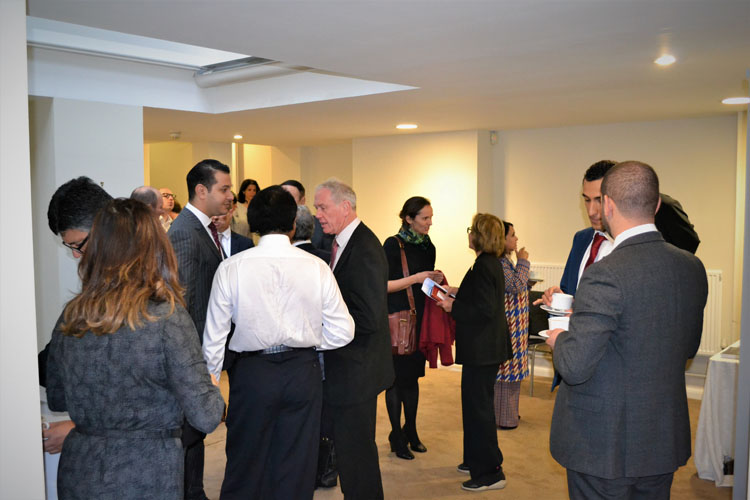The Arab British Chamber of Commerce hosted an ambassadorial roundtable on 28th November to enable a discussion on the potential investment and trading opportunities in the Kingdom of Morocco.
The roundtable, which was addressed by His Excellency Mr Abdesselam Aboudrar, Ambassador for the Kingdom of Morocco, attracted an audience of senior business executives from different industries who were interested in the Moroccan market.
The event was opened by Mr Abdeslam El-Idrissi, Director of Trade Services and Acting General Manager, ABCC, who described his pride as a Moroccan to be able to welcome the Ambassador to the Chamber. Mr El-Idrissi stated that Morocco had evolved remarkably over recent years from a mainly artisan economy to one where hi tech industries were now flourishing.
Rt Hon Baroness Symons of Vernham Dean, Chairman, ABCC, said that the roundtable offered a platform to discuss the important developments taking place in Morocco such as the recently opened high speed rail network.
H E Mr Abdesselam Aboudrar began by stating that he intended to address some key aspects of the relations between the UK and Morocco.
He described Morocco a major market of 35 million people which enjoyed a unique strategic location as the crossroads for links between Africa, Europe and the Middle East.
Morocco’s success was attributed to its stability, security and the openness of its institutions and heritage which was reflected in the rule of law, genuine pluralism, multiparty system and active civil society, the Ambassador explained.
The country had been one of the earliest to adopt structural reforms to create a more competitive economy. Morocco had a free market economy and laid emphasis on an enhanced role for the private sector as it sought to build a more diversified economic base. It boasted strong agriculture, industry and manufacturing and was successful in maximising its resources such as phosphates mining.
Morocco had over the past two decades achieved high economic growth of 4-5% and was currently embarked on developing key sectors and boosting exports.
The strong banking system did not suffer adversely from the effects of the world financial crisis. The country’s financial sector enjoyed close relations with the UK through a partnership between the London Stock Exchange and the Casablanca Exchange. Morocco saw its financial sector as a hub to connect Africa to world markets.
The Green Morocco plan was designed to create a modern agricultural industry that would enable exports to be boosted.
With regards to free trade agreements, Morocco had signed FTAs with many major economies such as the United States and Turkey and was linked to the European Union by an association agreement.
Opportunities for investment were available in areas like the expanding phosphates, automotive, aerospace and logistics sectors.
The Ambassador said that the automotive industry was booming following the stimulus provided by the Tanger Med Port and since Renault had opened up its vehicle assembly plant. The aviation industry, meanwhile, was located in Casablanca where over 100 companies employed over 11,000 employees involved in assembly, electrical wiring, maintenance, repair and engineering activities.
The logistics sector had grown through investment in ports and infrastructure to enable Morocco to take advantage of its position as a crossroads for Africa, Europe and the Middle East.
Renewable energy was a high priority for development with an investment led growth in solar energy which illustrated Morocco’s determination to take advantage of its abundant natural resources. The IT sector had developed substantially in recent years following the adoption of initiatives to attract investment in new industries and the training of skilled engineers.
A strategy to boost tourism had achieved increased visitors by enhancing the quality of what was on offer. Tourism was not just about visitor numbers, but about making improvements in facilities, transport and infrastructure. A growing number of British tourists were interested in exploring Morocco’s rich cultural heritage.
Commenting on the good relations that Morocco enjoyed with the UK, the Ambassador stated that these were founded on eight centuries of engagement. He looked forward to the deepening of their commercial and trading relationship. Morocco saw an opportunity to strengthen bilateral cooperation after Brexit as the UK sets out on a new era seeking to build on new relations needed to replace what it had with the EU.
After making great strides in the development of its infrastructure and governance system, Morocco was now turning to improving human development by laying greater stress on education, training and healthcare.
The roundtable concluded with comments and questions to which the Ambassador responded.
The Deputy Ambassador, Miss Lalla Soumia Bouhamidi, remarked that the strategic dialogue between the UK and Morocco was addressing all the issues around education and training where collaboration could be strengthened.
Baroness Symons closed the meeting by thanking the Ambassador H E Mr Abdesselam Aboudrar for a comprehensive overview which had highlighted real potential for developing new links between Morocco and the UK.

